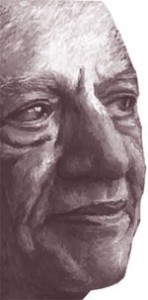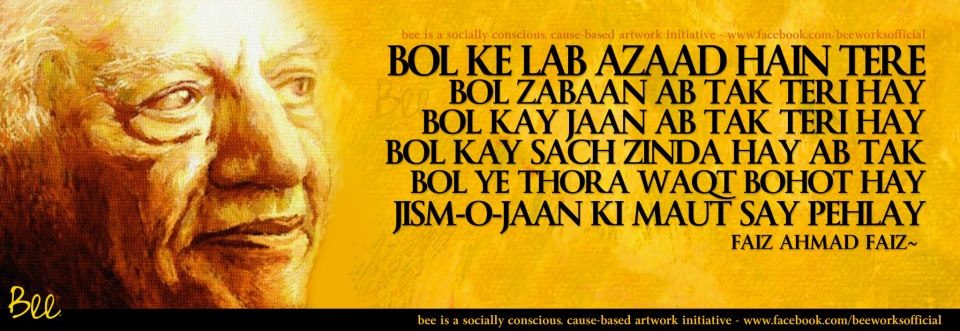Rauf Malik, Surkh Parcham,, March/April, 2011 issue.
Translated from Urdu by Prof. Hassan N. Gardezi
 This year Faiz would have been 100 years old were he still alive. Much is being written regarding his literary skills, poetic genius and social thoughts on this centenary of his birth, and more will be written in the future. But this writer is neither a literary critic nor a social analyst to comment on the beauty and value of Faiz’s literary and other enlightening works.
This year Faiz would have been 100 years old were he still alive. Much is being written regarding his literary skills, poetic genius and social thoughts on this centenary of his birth, and more will be written in the future. But this writer is neither a literary critic nor a social analyst to comment on the beauty and value of Faiz’s literary and other enlightening works.
In these lines there will be an account of some aspects of Faiz’s life which have generally remained out of sight. In addition to being a great poet and intellectual Faiz was a member of our society who, not only was keenly aware of the living conditions of various layers and classes, he was also involved in frequent struggles to improve these conditions as an activist.
In his early writings Karl Marx wrote that the philosophers have only interpreted the world, the point is to change it. Faiz too was not only conscious of the sufferings and problems of his people but took practical steps to redress them. As he says:
The darkly brutal spells of countless centuries
Woven into tapestries of silk and satin
Bodies sold in alleyways and market places
Smeared with dust, bathed in blood
Cannot be helped if my glances wander to those sites
Though your beauty is still so lovely to behold
There are other sufferings besides the suffering of love
There are other pleasures besides the pleasure of love
Having witnessed and perceived this state of affairs, the poet turns again to his beloved to say:
This world of sorrows has estranged me from your memories
More enticing than your charm are the sufferings of the living
In order to make his living, with all the worries and hardships involved, Faiz showed up in Amritsar to take the job of teaching English at MAO College. Amritsar in those days was emerging as a commercial and industrial city of central Punjab. Several small and large industrial units were being established there and the number of skilled and unskilled workers was on the increase. Although several of these industrial units had been set up in Amritsar proper, a suburban settlement of the city had become a prominent industrial base of central Punjab. This was the settlement where Faiz initially started his study circle with labourers and craftsmen. He was assigned to this work by the Amritsar Labour Federation which he had joined.
Speaking of these study circles, Faiz told the senior journalist, Meem Sheen:
“I started work in the industrial area of Amritsar, with my interest in the workers’ issues. I was a member of the Amritsar Labour Federation in those days. This Federation was affiliated with the All India Labour Federation. They told me about the date of his arrival by the morning train. His stay was at the Green Hotel. I fetched him from the railway station and took him to the hotel. Those were the repressive days of Liaquat Ali Khan (Prime Minister 1947 – 1951). The CID (Central Intelligence Department) used to shadow every progressive intellectual. From his hotel room window Faiz spotted a suspicious man outside and called me to ask if I knew him. I looked and said he has to be one of those secret service spooks. Faiz smiled and after a moment of silence asked me to close the window. We talked for a while before the Union people arrived and took us to the conference place. The conference sessions lasted the whole day and on our return we noticed the same man following us. When we sat for dinner Faiz said, bring that man in; the poor fellow must be hungry keeping a watch on us all day. I went out and gave him the invitation which he readily accepted and joined us at the meal. He thanked Faiz, saying that he did not have even a drink of water all day, because of the kind of job he had to do.”
Presiding Over the First May Day Meeting in Pakistan
Talking to Ayub Mirza, Faiz recalled that the Progressive Writers Association and similar organizations came under official attack for the first time in 1948. Sajjad Zaheer (leader of Communist Party of Pakistan at the time) had to go underground. At the same time a May Day meeting was held in the YMCA hall in Lahore. There were red banners fluttering inside and outside the hall. There were also the hammer and sickle flags unfurled. It looked like the Red Revolution had taken over the YMCA hall and was going to spread to the neighbourhoods of Garhi Shaho and Dharampura. I presided over the May Day meeting.
In 1948, Faiz also represented the Pakistan Labour Federation in the annual conference of the International Labour Federation held in San Francisco, and the following year he was in Geneva representing his country’s Federation in an important meeting of the ILO. On his return from these meetings he called an assembly of the Federation workers and presented his reports of these meetings in a delightful manner.
As vice-president of the Pakistan Trade Union Federation, Faiz remained in contact with the ILO as well as the worldwide organizations of workers. As the Pakistan Federation was affiliated with the International Trade Union Federation, Faiz regularly reported on its activities to the latter.
In April 1950 the Pakistan Trade Union Federation convened an important joint conference of all its affiliated unions in Lahore. The International Federation was also invited to send its representative to this conference which sent one Mr. Thornton on its behalf. He probably belonged to Australia.
At the end of the joint unions’ conference a public meeting was held in the gardens outside the Mochi Gate attended by thousands of workers and ordinary citizens. Mirza Ibrahim and other labour leaders made spirited speeches at this meeting. At the end Mr, Thornton made a speech in English which was translated by Faiz.
Next day the veteran journalist, the late Meem Sheen in his report of the meeting wrote that MR. Thornton’s speech reminded him of Attaullah Shah Bukhari (a fiery public orator of the time).
The trade union activities of Faiz were not confined to the initial few years of the independence of Pakistan. He remained active in this field even after bearing the hardships of over four years of imprisonment in connection with the alleged Rawalpindi Conspiracy.
During his stay in Karachi Faiz was appointed principal of the Abdullah Haroon College. There was a slum area in the suburb of the city inhabited by many poor fishermen. While fishing at sea some of these fishermen would stray into Indian waters and often arrested for violation of the international border. Likewise the Indian fishermen were arrested for crossing into Pakistani waters. When Pakistani Fishermen formed a Union to protect their rights, Faiz guided them in every respect, and got in touch with higher authorities to solve their problems. In short Faiz stood for their cause at every step.
(Translator’s Note: In a conversation with Faiz I learned that he used to go straight to the Indian Prime Minister, Indira Gandhi, to get the Pakistani fishermen, caught in Indian waters, released).
